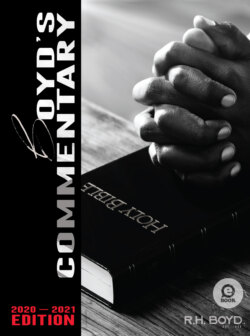Читать книгу Boyd's Commentary - R.H. Boyd Publishing Corporation - Страница 56
На сайте Литреса книга снята с продажи.
III. THE REWARD OF SELFLESSNESS (LUKE 6:32–36)
ОглавлениеVerse 31 set the table for the next unit of Jesus’ discourse beginning in verse 32. His disciples were instructed to do unto others what they wanted to be done to them. Jesus asked, “If you love those who love you, what credit is that to you?” (Luke 6:32, NRSV). He was comparing the degree of difficulty to love when it is reciprocated versus showing love when it’s not. According to Jesus, anyone can do the former, even sinners. The golden rule, however, goes beyond this in that it seeks nothing in return for its love. Jesus made the same argument in verses 33–34 when He again asked, “If you do good to those who do good to you, what credit is that to you? . . . If you lend to those from whom you hope to receive, what credit is that to you?” (NRSV). Again even sinners do this.
The three commands are reemphasized in verse 35: “Love your enemies, do good, and lend, expecting nothing in return” (NRSV). These conditional acts of love, according to Jesus, will yield for the believer a great reward. Though Jesus was opposed to His followers doing good deeds only for an expected reciprocation, He motivated His listeners to instead expect blessings from God for their faithfulness. Believers are not to focus on the things this world provides but on the inexhaustible treasures only God can provide. Those who hear and heed His voice, Jesus said, will be sons and daughters of the Most High. Because God is kind even to the unthankful and evil, Jesus assured His followers the grace they show to others (though undeserving) is reflective of God’s character and orientation to His people. So, He ended this section of His sermon by telling His followers to “be merciful, just as your Father is merciful” (6:36, NRSV).
